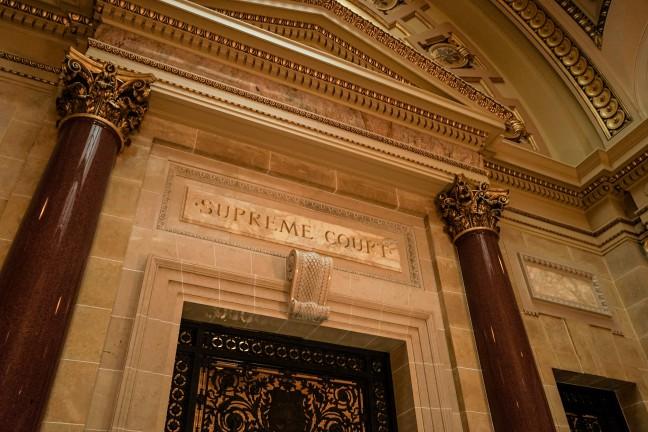On Feb. 20, the state held a primary election for the Wisconsin Supreme Court race, the general election for which, will take place April 3. After Madison attorney Tim Burns lost in Tuesday’s primary, the candidates have been narrowed to Sauk County Circuit Court Judge Michael Screnock and Milwaukee County Circuit Judge Rebecca Dallet.
Running partisan campaigns have considerably scrutinized each candidate. Screnock has argued Dallet has been running a campaign based on her opinions of women’s rights, workers’ rights, environmentalism and funding for public education. She has also released anti-Trump advertising.
Screnock is also subject to partisan criticism with a history of being anti-abortion. He has also received significant funding from right-wing special interest groups, including the National Rifle Association.
In an interview with Milwaukee Public Radio, Dallet said, “We … need to remember that this is a nonpartisan race and that judges should not be running with political messages, taking issues on cases before those cases come before the court.”
While she is right that this is a nonpartisan race, the issue is there really shouldn’t be a judicial election in the first place — these positions should remain appointed positions, as originally stipulated in the Constitution.
Despite the fact that judicial elections are not technically partisan races, the omission of an “R” or “D” next to the candidates’ names on the ballot does not eliminate the partisanship. Allowing the election and reelection of Supreme Court justices effectively aligns these judicial elections with all partisan elections. In other words, subjecting justices to an election, thereby giving voters a choice over which to divide, means the selection will inherently be partisan.
Conflicts of interest jeopardize integrity of Constitution, Wisconsin Supreme Court
Moreover, the opportunity for reelection means the need for public support and external funding will inevitable influence justices’ court decisions. Take Screnock, for example. Let’s say he is elected this year and serves out his full term on the Wisconsin Supreme Court. Given his significant funding from the NRA, if he wants to run for reelection 10 years down the road, he will indubitably be inclined to vote on relevant cases in a way that will benefit the NRA. The NRA will be much more inclined to support Screnock financially if they have some level of assurance that his tenure on the Supreme Court will, in turn, benefit them.
Additionally, take a look at the historic Supreme Court of the United States Brown v. the Board of Education decision. Despite its unanimity within the court, publicly, it was a widely unpopular decision at the time, prompting protests and riots around the country. It is not unreasonable to suggest that if a majority vote had elected the United States Supreme Court justices of the 1950s, keeping widespread distaste in mind, the electees likely would not have voted to overturn Plessy v. Ferguson. Strictly speaking, what the majority wants is not always necessarily fair and just, and studies have shown the majority frequently doesn’t even know what they are talking about.
According to a C-SPAN poll conducted, only 34 percent of subjects surveyed were familiar with the 2001 Bush v. Gore decision. A study from the University of Pennsylvania Annenberg Public Policy Center found 32 percent of subjects polled could not correctly identify the Supreme Court as one of the three branches of government. A Gallup poll about the late Justice Antonin Scalia found that 44 percent of Americans were either unfamiliar with or had no opinion of the justice.
How can we trust a population largely unfamiliar with the role of the Supreme Court and the influence of its proceedings to elect justices to serve on the bench?
What students need to know about Wisconsin’s Supreme Court elections
Being a Supreme Court justice necessitates exemplary understanding of law, knowledge of precedent and morality. The vetting process a public election provides is simply not significant or scrutinous enough to determine who is most appropriate for the position. On the other hand, the process of confirmation hearings from those closely associated with the law is much more significant and likely to yield a valuable result.
Many argue that giving the president — or in the case of state Supreme Courts, the governor — the power to select justices allots more jurisdiction than should be appropriate, given our focus on the separation of powers. But throughout history, justices have frequently voted against the party of the president that appointed them. The lifetime appointment to the court means justices don’t have to worry about making decisions or advancing an agenda that will either ensure or injure their chance for reappointment.
Dallet and Screnock have both justifiably criticized the other for running a campaign that is overly partisan. But at the end of the day, neither of them is really at fault because they should not be subjected to an election in the first place. Elections force a political agenda. The very process of judicial elections is nonsensical at best and unconstitutional at worst.
Cait Gibbons ([email protected]) is a sophomore majoring in Chinese with a certificate in statistics.




















